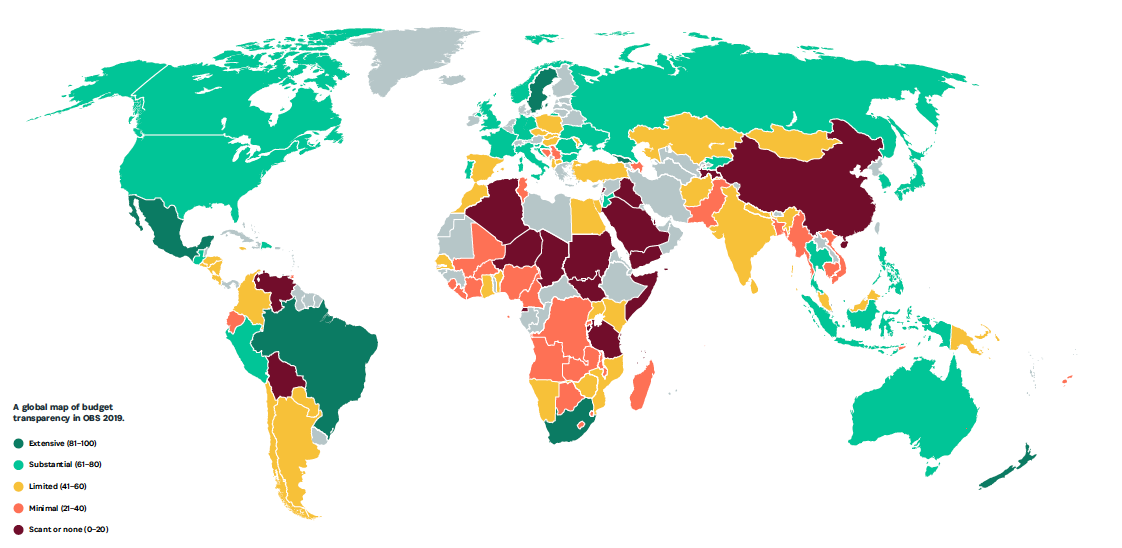Amid a global pandemic that is forcing governments around the world to launch new spending measures, the International Budget Partnership’s (IBP) latest Open Budget Survey shows why there is reason for concern: four out of five of the 117 governments assessed failed to reach the minimum threshold for adequate budget transparency and oversight, under international standards.
Governments, for instance, often fail to publish key budget documents, that would clearly explain their budget policies, decisions and outcomes, according to the new report. Worldwide, one-third of the eight key budget documents that governments should publish are not available to the public.
“While the pandemic clearly demands swift and decisive action, budget transparency, civic engagement and well-functioning oversight are imperative as well,” says Warren Krafchik, IBP’s executive director. “As governments respond to this massive public health emergency, budgets must remain open and transparent, and officials must allow inclusive public engagement during planning and implementation.”
As research by IBP and other organizations demonstrates, open budgets offer a promising pathway for countries to thrive socially and economically. They can restore trust in governments and strengthen frayed relationships between public institutions and the people they are meant to serve.
“This crisis has unfolded at a time of great frustration over stark public inequities and governments’ failure to address them,” Krafchik warns. Public trust could be further undermined if governments do not address the pandemic effectively and resort to action that is arbitrary or favours certain interests over others,” warns Krafchik.
While the latest Open Budget Survey (OBS) was completed just before the pandemic hit, it provides a telling snapshot of current government practices in 117 countries related to budget disclosure, opportunities for public engagement in the budget cycle, and effective checks and balances.
Figure 1: A global map of budget transparency in OBS 2019
Leaders and Laggards
“The findings tell the story of leaders and laggards,” says Vivek Ramkumar, IBP’s senior director of policy. “Clearly, many governments aren’t meeting minimum international standards. But the good news is that others are reaping the benefits of adopting more transparent, inclusive and participatory approaches to budget planning and implementation, and their examples point the way to others. It can be done, and relatively quickly.”
Budget transparency is assessed in the OBS by the public availability and contents of eight key budget documents that all governments are expected to publish as per international standards. Specifically, the survey examines whether they are published online in a timely manner and the information is comprehensive.
- The global average transparency score was 45 out of 100, short of the 61 considered the minimum threshold to foster an informed public debate.
- Thirty-one governments scored 61 or higher, showing the goal is reachable by a range of government types. For example, Guatemala, Indonesia, the Kyrgyz Republic and Ukraine all reached or surpassed a score of 61 within the last two OBS rounds.
- Examples of strong budget transparency are found in six of the seven regions of the world.
Public participation is assessed based on formal opportunities for civic organizations and individuals to engage and provide input throughout the budget process.
- The average global score for public participation is dismal: 14 out of 100.
- However, here too, there are examples of what can be achieved: The Mexican government designed a “social comptrollers” system through which programs established to aid disadvantaged communities are directly monitored by committees of beneficiaries. And in a bold experiment, the New Zealand government recently asked for public input during development of its first “Wellbeing Budget.” The budget requires all new spending to be directed toward five goals: bolstering mental health, improving child well-being, supporting indigenous peoples, building a productive nation, and investing in the country, such as more and better health care.
Oversight is measured based on the role played by legislatures and supreme audit institutions (SAIs) in the budget process.
- A score of 61 out of 100 is considered adequate oversight.
- Of the 117 countries surveyed, 34 have adequate oversight from their legislature, 71 from the SAI and only 30 from both institutions.
“Open budget systems alone cannot solve the pandemic. But they can strengthen the bonds between people and government and improve the delivery of public services. We need governments either to commit to transparency and public participation or accelerate the progress they have already made,” says Sally Torbert, an IBP program officer and lead author of the report.
“We have been watching these indicators for more than a decade and recognize the consistent but incremental overall progress,” says Ramkumar. “However, it is going to take a concerted cross-stakeholder effort to ensure that governments reach adequate levels of open budgeting in time to contribute toward the UN Sustainable Development Goals and the Paris Climate Agreement, let alone ensure that countries have the oversight systems to tackle the next crisis. For this reason, today IBP is launching a call to action to galvanize civic actors, businesses, donors, and governments to work together to magnify and accelerate progress on open budgets.”
IBP first launched the survey in 2006 with the goal of assuring that all people, especially those from under-served communities, have the opportunity to understand and influence how public money – their money – is raised and spent. Typically, fielded every two years, data are collected by independent civil-society budget experts who are not beholden to any national government. Their findings are reviewed by anonymous peers, and representatives from the assessed governments are offered the opportunity to review and comment on the findings.
Open Budget Survey 2019 global report
Open Budget Survey 2019 executive summary
Open Budget Survey 2019 country results
Open Budget Survey 2019 data explorer
On the blog
Open Budgets in the Time of COVID-19, by Miranda Stewart and Teck Chi Wong.
Budget Transparency: The Open Budget Survey 2017 – Part 1, by Teck Chi Wong and Miranda Stewart.
Budget Transparency: The Open Budget Survey 2017 – Part 2, by Teck Chi Wong and Miranda Stewart.




Recent Comments